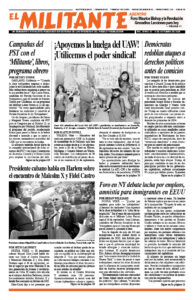LOS ANGELES — A tentative settlement in the nearly five-month-long Writers Guild of America strike against the bosses’ Alliance of Motion Picture and Television Producers was announced Sept. 24 after several days of talks between the union negotiating committee and the major Hollywood studios and streaming producers. The 11,500 writers were joined on the picket lines in mid-July by striking members of the Screen Actors Guild-American Federation of Television and Radio Artists.
The Los Angeles Times reports the agreement includes higher pay rates for writers, improved pay for residuals and new guidelines restricting the use of “artificial intelligence.”
“What we have won in this contract,” the WGA negotiating committee said in a statement sent to union members, “is due to the willingness of this membership to exercise its power, to demonstrate its solidarity, to walk side-by-side, to endure the pain and uncertainty of the past 146 days.” The deal contains “meaningful gains, and protections for writers in every section of the membership.”
The union leadership said the picket lines will come down, but that no one should return to work until the union goes through ratification procedures that will culminate in a vote by the membership.
While WGA picketing will end, the union leadership strongly encouraged members to join the ongoing SAG-AFTRA picket lines.
In days leading up to the settlement, writers’ union members responded to news of the negotiations by bolstering their picket lines outside the studios. On Sept. 22, hundreds of WGA members, joined by members of SAG-AFTRA and other unions, marched around Netflix’s Los Angeles office in a spirited show of resolve.
“The strike has been devastating in terms of income and work opportunity, but also inspiring,” Alessandro Carmon, a Writers Guild member for 16 years, told the Militant, summing up the mood of many strikers. “It’s a turning point for labor in Hollywood and the labor movement in general.”
WGA picket captain Brenden Gallagher, a television drama writer, said, “I’ve been optimistic about the outcome the entire five months of this strike. We’ve been prepared to negotiate since the beginning, but we will be out here as long as it takes to win our demands.”
The writers have been fighting for a minimum level of staffing as production bosses have cut the number and work time for writers, slashing their pay. The studios have pushed writers to produce scripts for shows that haven’t been sold yet, eliminating the past norm of making pilot episodes to win contracts before starting regular production.
Traditionally writers received what are called residuals, modest regular pay for movies, television programs and commercials whenever they are rerun. However, with streaming, where programs are available online, the studios have balked at paying writers based on the number of viewings.
Writers also want protection on the use of artificial intelligence, where producers take and manipulate images and script work products to use in future shows without paying the author.
Even if Writers Guild members vote up the tentative contract, production of movies, television or streaming on any significant scale will still depend on the bosses reaching an agreement with the 160,000 actors in SAG-AFTRA, who face many similar issues.

